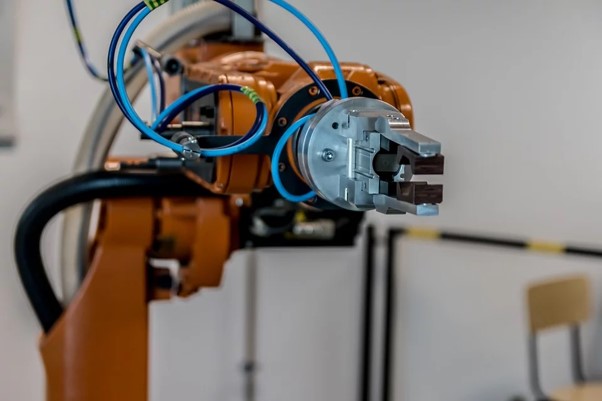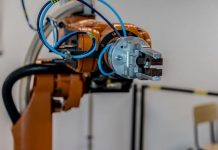Whatever industry you’re in, there’s a resounding prediction that you’ve probably heard. The world of work is rapidly changing, and a lot of jobs will be lost in the future as they get outsourced to technology and robots.
What’s not mentioned as clearly is that new jobs will be created to replace the old ones, so people—and businesses—will have to adapt. Even today, we’re already seeing automation being implemented widely. Instead of taking client orders directly, many businesses are turning to eCommerce platforms. Bank transactions are now mostly done online, and turning to Alexa for the news and weather is already commonplace in many homes.
Although automation has definitely become a buzzword, it’s not only the big companies that are talking about it. It’s also going to impact and even change how small and medium sized businesses work, from consultancies and managed service providers to clinics and restaurants.
Automation is already here and it’s advancing quicker than many can keep up. Here’s what small businesses can expect in the coming years and decades.
Automation will Transform the World’s GDP
A 2017 PwC report has estimated that smart automation will add £12 trillion (or $13.7 trillion) to the world’s total GDP by 2030. Alongside this, many jobs will be displaced, forcing people to learn new skills to keep up with technological advances. In the UK, the forecast is 3% of jobs will already be automated this early 2020 compared to 2018, and this will go up to 30% by the mid 2030s.
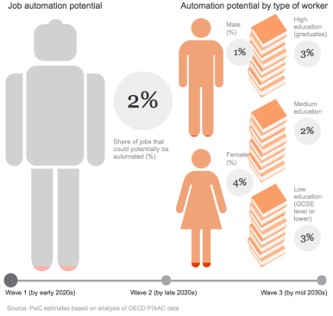
Source: PwC
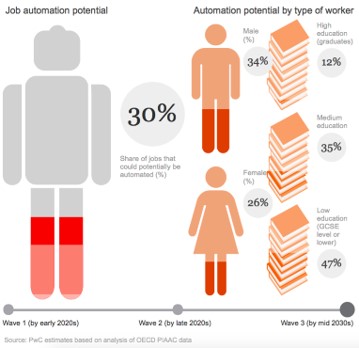
Source: PwC
That’s a huge change over around ten years. More specifically, the Office of National Statistics reported based on 2017 data that around 1.5 million people in England might lose their jobs because of automation. This includes people working in small businesses, of which there are around 5.8 million in the UK.
How Automation will Displace Jobs
While you might hear people saying that jobs will be lost to automation, a more accurate statement would be that automation will change the type of jobs that we have. Automation will take over tasks that are rote and manual, such as driving, assembly line work in factories, or formulaic calculations. This still leaves more complex tasks that require critical thinking, problem-solving, and empathy.
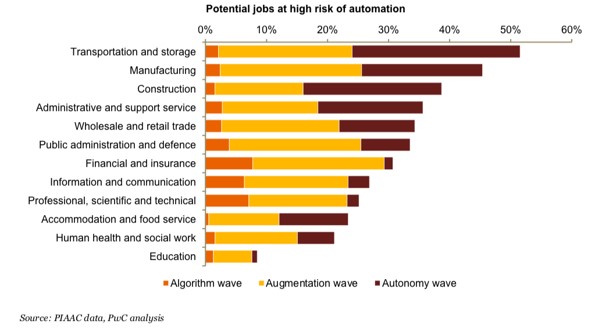
Source: PwC
Because of this, industries will be impacted differently. For example, wholesale and retail trade, manufacturing, administrative services, and transport will adjust the most. On the other hand, there will be less displacement of jobs in fields like healthcare and mental health, which rely on direct human interaction. Creatives like writers, artists, and musicians will also more or less get to keep their roles, and demand for skilled managers and IT experts will increase because of the technology that they’d have to oversee.
Rather than replacing human beings completely, technology will most likely enhance and supplement our work. Either way, more technology will be filtering into practically every kind of workplace.
What Small Businesses Can Expect
Higher productivity and lower costs
If automation is expected to bring in trillions of pounds for the world as a whole, that’s because it significantly cuts down on labour costs and boosts productivity. This is true even for small businesses. Because of fewer employees, roles in small businesses can be more fluid, and a single person might be handling different kinds of tasks. Usually, the business owners themselves are juggling multiple roles at once, from negotiating with customers to hiring employees. With the help of automation, their workload can become significantly lighter, and instead of getting bogged down by simple tasks, they can focus on the more “human” aspects of their businesses, such as connecting better with customers or designing a more enjoyable experience for them. Automation can also perform certain processes faster than people can while remaining free of human error.
People working alongside technology
Ultimately, automation will vastly alter the workflow of businesses. Before incorporating automation into their workflow, business owners will have to do some planning first to figure out which processes can be conveniently delegated to automation. Maximum productivity won’t be achieved at first because employees will have to adjust to working alongside the technology. Even today, functions such as payroll and sending subscription emails are already mostly automated. As more advanced tools are created, it’s also just as helpful to pause and consider what the limits of automation are. Chatbots, whether for customer support or social media, are already relied on by small businesses to address initial customer queries. However, if the concerns are too complex, these chatbots will direct customers to actual people. In this case, the system involves both chatbots and employees for maximum efficiency.
Business insights from data
Automation isn’t just about getting more done in less time. Through machine learning and AI, it can also crunch through huge amounts of data quickly and figure out patterns there that can tell you how to improve your business. Software like this abounds already, and many small businesses use it regularly. You can subscribe to HR software with employee analytics to find out how to motivate your employees, with insights such as where people are performing best and when they’re the most productive. Some small businesses in retail even turn to POS (point-of-sale) software that optimises your inventory and pinpoints your customers’ buying habits. Social media analytics are already a staple for businesses with active accounts on platforms such as Facebook and Instagram.
A culture of learning
Small businesses will inevitably end up investing more in ongoing employee training. Because new technology will keep on entering the workplace, employees will have to be trained to become proficient in them. Aside from adding new technology to their work, business owners may have employees making major shifts from one role to another. Even today, helping employees learn new skills is already a major need for businesses:
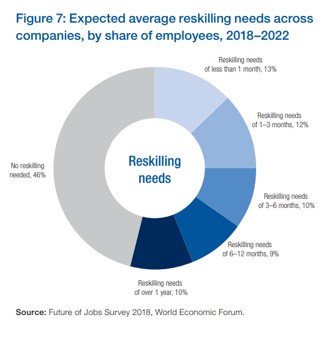
Source: World Economic Forum
One thing is for sure: in a rapidly competitive landscape, small businesses will have to encourage adaptability in their work cultures if they are to keep up. An important quality to cultivate, whether owner or employee, is the ability to learn fast. Soft skills as well as critical thinking will also become even more highly valued.
Riding the Wave of Automation
We’re already at the start of 2020—the first wave of automation as studied in the PwC report—and the pace will only get faster from here on, to the point that how small businesses operate might look very different by 2030. Whatever industry you’re in, it’s good to remain technologically agile and to constantly assess how automation can move your business forward. Individuals will have to pick up new skills consistently, but businesses—whether large or small—will also have to be just as fast on their feet to stay ahead.


